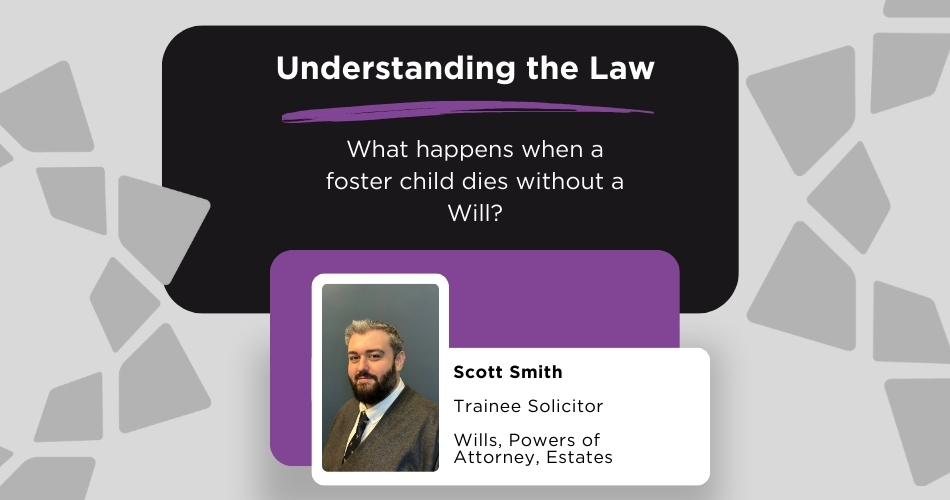
What happens when a foster child dies without a Will?
By Scott Smith - Trainee Solicitor - Private Client Supporting a Grieving Foster Parent Through an Unimaginable Loss Losing a...
Scullion News & Resources

When we lose a loved one, the last thing we wish to think about are the administrative tasks involved. The procedural formalities that follow can often feel burdensome and distract from the ability to grieve and process the loss. It is therefore not surprising that, right after the death of a loved one, you find yourself asking, What now? This article explores the step-by-step process for handling the estate of a loved one in Scotland.
There is no manual for grief. What you will find here are things to consider when the unthinkable happens to a loved one. How do you cope with the administrative burdens while lugging around your own grief and loss? To best answer this, let’s explore the first days after you receive the news.
In the days following the death of a loved one, often shock and grief are setting in. It is not unusual to be overwhelmed with what comes next. When an individual has no experience of loss, it is rare that they will know the next steps, as it is not a topic that is widely discussed. Here, we lay out some tips for the days after:
Everything in life is done at 100 miles an hour. We are always in a rush. When we are dealing with grief and loss, it often feels like the world has stopped spinning. In the days after a death, there is no need to panic about dealing with the administrative burdens, as these take time. The process of dealing with the death of a loved one can be slow and protracted at times.
The first step is to register the death. This is done at your local registration office. Until the death is registered and you have a valid death certificate, there is very little you can do. The registrar will provide you with a death certificate, which will cost around £15 per copy. They will refer you to a service called “Tell Us Once”. This is a service whereby the DWP, HMRC, and local authorities are notified of the death.
Once the death certificate has been obtained, the next step is generally to plan the funeral. The deceased may have prepared for this by way of a funeral plan or a direction in a Will. Alternatively, it may be up to you, as the family or friend, to plan this at your discretion. The worry is often how this will be funded, especially where you may not have access to your loved one’s funds at this stage. Funeral directors are aware of this and will be generally sympathetic and patient with it. You may send the funeral invoice to the bank that your loved one used, which will typically release the funds to the funeral director directly before the estate is dealt with. You may also fund this personally and claim it back from the estate.
When the difficult task of planning the funeral is over and your loved one has been laid to rest, you may, at this stage, begin to consider the assets that are left behind—property, money in the bank, a car, a pension, personal belongings, and so on. The extent of the assets in the estate will determine the course of action that is required.
Where the deceased left a small estate, e.g., no property and funds under £36,000, it is likely that you will be able to deal with the estate using just the death certificate and Will, with no legal assistance required. Where no Will is left, the process may vary.
Where the deceased had property, either in joint names with a spouse or partner or in their own name, Confirmation may be required from the Court to sell or transfer the property. Confirmation is a process whereby an application is made to the local Sheriff Court with an inventory of the estate. This may include a list of all the assets that your loved one held at the time of their death. The court will then authorise the administration of the estate by providing a certificate of Confirmation. You may have heard this referred to as Probate, which is the English equivalent.
Where a person who has passed away in Scotland owns the heritable property (land and/or buildings), Confirmation has to be obtained to sell or transfer this. There are exceptions to this rule; our upcoming article on Survivorship Destinations will specifically refer to this. Confirmation may also be required where there is no heritable property but the deceased had considerable assets in the bank, or investments and shares. Again, the application to the court is made, and a certificate is provided to allow such funds to be released. There may also be some HMRC involvement required before Confirmation is applied for depending on the make-up of the estate.
The process of handling the estate of a loved one can be daunting. Many families will look to engage a Solicitor to assist with the application for Confirmation and other aspects. A skilled Solicitor with high attention to detail can ease this process. They can handle the administration of the Estate from beginning to end. This can take the pressure of having to deal with the administrative burden of losing a loved one.
Our Private Client team has considerable experience dealing with these matters and will ensure that the Estate of your loved one is handled with sensitivity and compassion. If you require our assistance or further advice, please do not hesitate to contact us on 0141 374 2121 or leave us your enquiry here and a member of our team will get back to you promptly.

By Scott Smith - Trainee Solicitor - Private Client Supporting a Grieving Foster Parent Through an Unimaginable Loss Losing a...

Have you been appointed as an Executor in a Will and don’t know where to start? Let us help! An...

We are proud to share two important promotions in our Wills, Powers of Attorney and Bereavement team. These changes show...